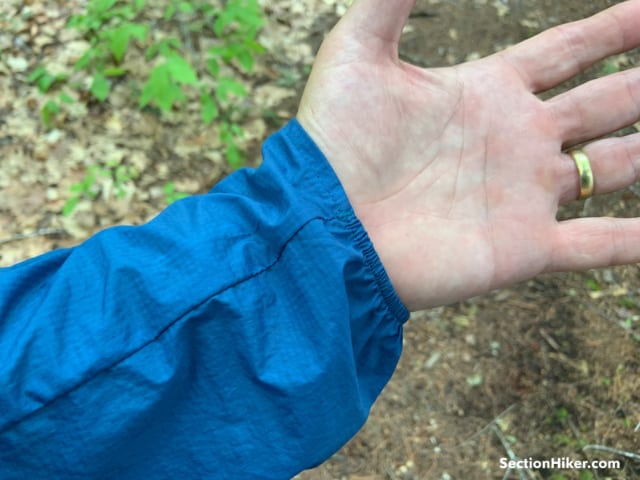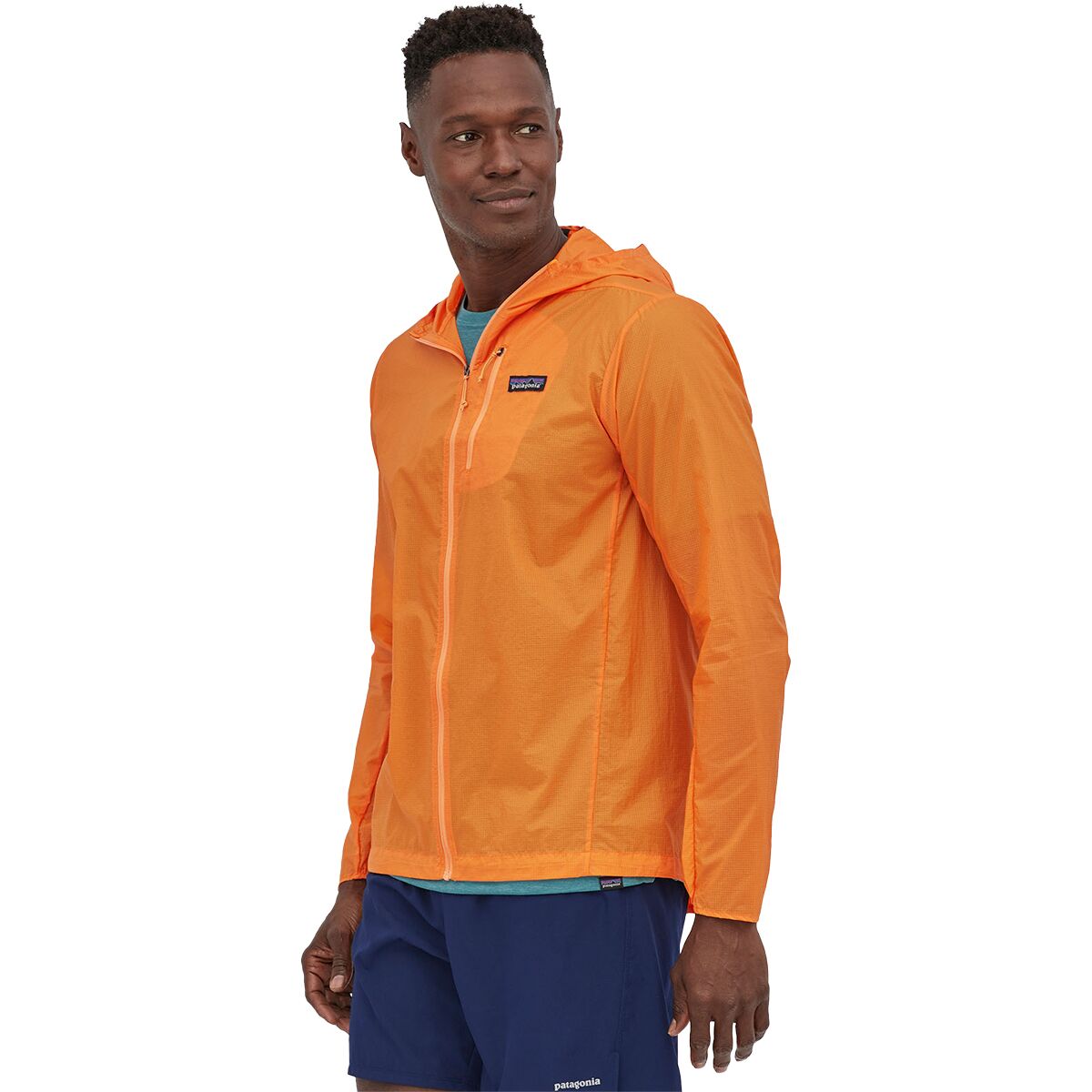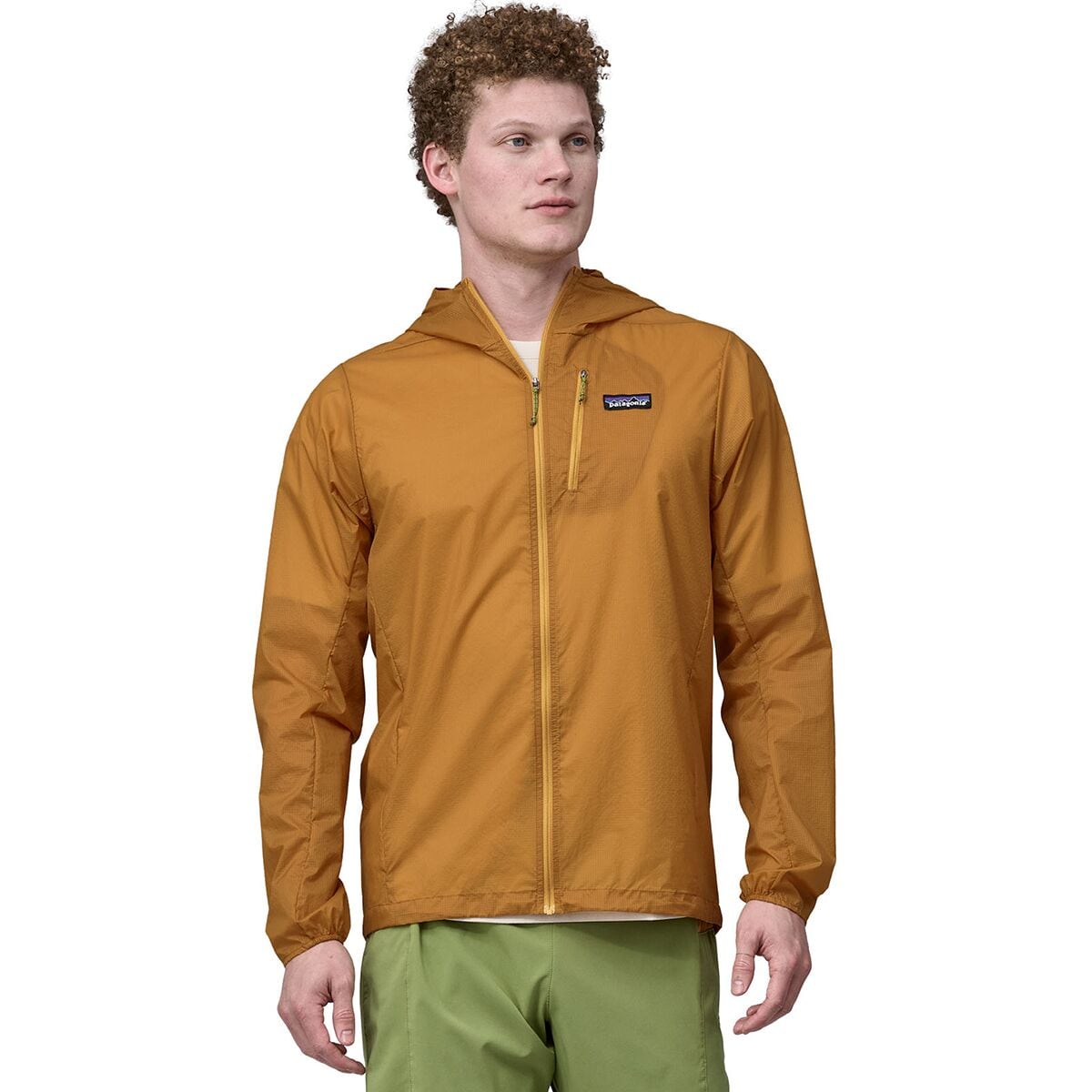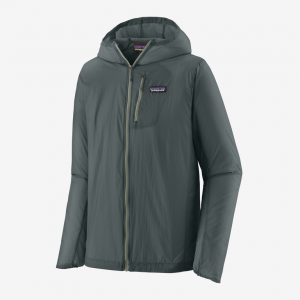The Patagonia Houdini Jacket is an ultralight jacket designed to help you stay warm in cool windy weather. It’s not waterproof or insulated but provides a windproof layer to prevent the cold air from stripping away the heat trapped in your baselayer or mid-layer clothing. Wind shirts and jackets like the Houdini are a remarkably versatile clothing layer used by many advanced hikers and trail runners. While they’re not strictly needed like a rain jacket, they fill a layering niche in mountainous locations and cool temperatures, that other garments don’t address.
Specs at a Glance
- Weight: 3.7 oz
- Gender: men’s (women’s model also available)
- Material: 1.2 oz (15d) recycled ripstop nylon
- Adjustable hood: yes
- Drawcord hem adjuster: yes
- Harness loop: yes
- Chest pocket: yes
- Wrist closure: elastic
- Drop tail: yes
The Houdini has a semi-adjustable hood, a full-length zipper, elastic cuffs, drawcord hem, and a zippered chest pocket that you can stuff the jacket into. It’s made with a textured ripstop that makes a slight crinkly sound when worn. The jacket has a factory DWR coating, but it quickly wears off when you stuff and un-stuff the jacket into a backpack repeatedly. That’s the problem with DWR coatings. They rub off. While drizzle does bead on the DWR when the jacket is new, you should not count on the Houdini or any other wind shirt/ jacket for rain protection because they don’t have a waterproof fabric layer like a proper rain jacket.
The Houdini is best thought of as a layering piece in a modular clothing system. It’s typically worn over a highly breathable base layer like a wool shirt or a fleece mid-layer to prevent wind from stripping away the warm air that they trap near your body. Most wind shirts and jackets aren’t all that breathable and rely on more mechanical means of ventilation, like half or full zippers, mesh pockets, or wrist cuffs, for releasing extra heat and moisture.
But the easy on and easy off nature of wind shirts or jackets is one of their key advantages over a bulkier jacket or shell. If you’re wearing a wind shirt like the Houdini and can’t get cool by zipping it open, you’d just take it off and stuff it into a pocket since it’s such a minimalist and easily packable layer.

The Houdini Jacket is pretty middle of the road as wind shirts and jackets go, in terms of weight, features, and performance. The Houdini hood has a rear volume adjuster, so you can shrink the crown of the hood for a better fit. But there aren’t any neck adjusters to let you crank down the circumference of the face opening, a feature that is desirable to prevent the hood from flapping loudly and violently in a stiff breeze.
Patagonia Houdini Jacket
Breathability
Comfort & Mobility
Hood Adjustability
Weight
Packed Size

The wrists cuffs are elastic and not adjustable and each cuff only has one elastic side so they can become very tight if you have beefy forearms and you try to pull them up to your elbows to release heat. The fit across the chest is fairly generous, which is good for layering, but the Houdini’s breathability, as with most wind shirts and jackets, is pretty lackluster. Your only real option is to drop the hood, pull down the center zipper, or to roll up your sleeves to dump excess heat.
Wind Shirts Comparison Table
| Make / Model | Fabric Denier | Weight |
|---|---|---|
| Arcteryx Squamish Hoodie | 30d | 4.9 oz / 140g |
| Patagonia Houdini Jacket | 15d | 3.7 oz /105g |
| Enlightened Equipment Copperfield Wind Shirt | 10d | 2.05 oz / 58g |
| Rab Vital Windshell Hoody | 20d | 4.6 oz /160g |
| REI Flash Jacket | NA | 4.3 oz /122g |
| Outdoor Research Helium Wind Hoodie | 30d | 5.3 oz /150g |
| Black Diamond Distance Wind Shell | 15d | 3.5 oz / 98g |
| Warbonnet Stash Jacket | 20d | 5.0 oz / 142g |
| Montbell Tachyon Hooded Jacket | 7d | 2.5 oz / 72g |
| Black Diamond Alpine Start Hoody | 20d | 7.4 oz /210g |
Recommendation
The Patagonia Houdini is an ultralight, nylon jacket designed to keep the wind from stipping away your body heat when you’re running or hiking. It’s not waterproof like a rain jacket and relies on active venting rather than breathable fabrics to vent excess moisture. While it has a basic feature set, including an adjustable hood, elastic wrist cuffs, and a zippered chest pocket, its principal strength is its small size and portability. Weighing just 3.7 ounces and stuffing down to the size of an apple, the Houdini is a great jacket to grab when you’re off for a quick hike or run and don’t want to be bogged down by a heavier jacket or fleece. If you’ve never owned a wind shirt or jacket, you’ll be amazed at how functional an ultra-thin layer is in cold windy conditions.
Compare 4 Prices
-

 Backcountry.com
Backcountry.com$99.00$41.98View -

 Amazon US
Amazon US$90.00$59.99ViewAmazon.com Price: $59.99 (as of 04/18/2024 21:20 GMT-0400) Details
Product prices and availability are accurate as of the date/time indicated and are subject to change. Any price and availability information displayed on Amazon.com at the time of purchase will apply to the purchase of this product.
-
 REI
REI$109.00$69.73View -

 Backcountry.com$109.00View
Backcountry.com$109.00View -

 Patagonia$109.00View
Patagonia$109.00View
Disclosure: The author purchased this jacket.
SectionHiker is reader-supported. We only make money if you purchase a product through our affiliate links. Help us continue to test and write unsponsored and independent gear reviews, beginner FAQs, and free hiking guides. SectionHiker.com Backpacking Gear Reviews and FAQs
SectionHiker.com Backpacking Gear Reviews and FAQs 

I don’t have this one but have a Montbell discontinued model. It’s my favorite layering piece! I often put it on at rest stops when it’s breezy and I’m sweaty. It’s also useful for hiking on cool, windy days, when just a shirt is not enough but any insulation gets me too sweaty.
One use barely mentioned in your review is that horseflies and deerflies and our Pacific NW version of black flies don’t bite through it–the reason I originally bought the wind shirt, after being thoroughly chomped on in Wyoming’s Wind Rivers. The flies considered my permethrin-sprayed shirt (great for mosquitoes but not biting flies) an appetizer!
You’re so right about windshirts being so flexible and handy to have.
I have orange Houdini and an orange MEC branded hoody I wear all year long.
I have this jacket, I love it. It is really soft and comfortable feeling. It is water resistant as well, definitely not water proof especially around the zipper, but it can take a small amount of rain. I have started bringing this and a snow peak umbrella on most of my summer trips. The umbrella takes most of the rain, the wind shirt catches any random drops that make it through, and realistically if it is raining hard enough that this won’t last I am going to stop and set up a tarp to rest under until it passes. A lot of this is dependent on backpacking in places where it doesn’t rain all day, so if I were to go to one of those places I’d probably pack differently, but I am mostly dealing with random small systems and just mountain weather. I also always carry a rain skirt as well.
The wind shirt and umbrella weigh less than my Arc’teryx Beta did. The umbrella also has the added advantage of being usable as a wind screen for cooking, temporary cover when getting in and out of the tent, and its easy to share. the biggest issues with it is mostly wind and holding it for long periods of time for extended rain.
I have a Houdini, and it’s an essential layering piece for me. Any windshirt will do, but I’d suggest everyone get one since they are so versatile and light.
The main advantage of windshirts is that they are very breathable compared to a hard shell. For me, the Houdini is breathable enough to wear hiking uphill, over wicking T or long sleeve T. It breathes way better than a hard shell. Uphill in 30-50 degree weather, it’s long sleeve synthetic T, liner gloves, liner hat, and Houdini. Also, for aerobic activity, they have a wider temp range than a fleece or other insulating layer.
Also, as grannyhiker mentioned, it’s a great bug shield. I often put it on immediately when I arrive in a buggy camp, even in hot weather.
For travel, it packs to small there’s nearly zero downside to bringing it along.
For colder days in camp you can layer it under insulation and hard shell… it doesn’t do much, but it adds versatility.
Like Tony, I also use it with an umbrella sometimes.
Windshirts are great!
Hi Adam. I’m curious about the level of bug protection. I mostly hike in Northern Europe where bug pressure can be substantial. I have used an Asics running jacket for wind and bug protection for years. It’s an awesome jacket and it’s practically bug proof. Unfortunately, the model has been discontinued. So I’m looking for something new. How bug proof is the Houdini? Mosquitoes and mittens? Thanks in advance! Lasse
Windshirts, including the houdini, are bug proof. I use mine (I own several) for just this purpose.
Thanks Philip! Btw, I meant to say “mosquitoes and midges”. I’m not looking for a mittens-proof jacket :D
Still using my Golite Bark. Have to replace some elastic soon. One of the few pieces that can be pulled into four season duty.
All I can say is when I did the Pressie Range 2 summers ago I wore my OR windshirt 50% of the time and that was last week of July. Phil and BPL can’t overstate the value of dedicated wind gear.
I do think the under 2 oz Montbell piece should be mentioned. How do you not justify that in your pack?
Bill in Roswell
I have and still use the first iteration of the Houdini, and it’s not anything like the past few versions. Mine is quite a bit more breathable and has an adjustable elastic cord in the perimeter of the hood opening so it can be cinched down during extreme windy conditions. Why Patagonia dropped that feature is a mystery!
I agree – the hood cannot be closed against the wind, very frustrating. For that reason I’m looking for a replacement.
Regarding breathability, I don’t have anything to compare it to, but I’ve heard others say the same thing.
I also used the first Houdini and really have nothing good to say about it. I suspect the new one is just as lousy. I found it to be very heavy and not exactly waterproof. It did not do a good job covering my skin and consequently, rain water often leaked down the back of my pants into my my private areas, leaving painful red rashes.
It’s not supposed to be waterproof…..
It’s not supposed to be waterproof?? Then what good is it??
It’s a windshirt. It’s more breathable than a rain jacket.
I bring my Houdini on every trip. You can hike when it’s cold out with just a light shirt on and sure it gets wet but keeps you warm. And when you get to camp it dries quickly. If it’s buggy,it also works great. And for a few ounces you can’t beat it. A few times I got stuck in a little rain, no problem. I bring it instead of a rain jacket 90 percent of the time.